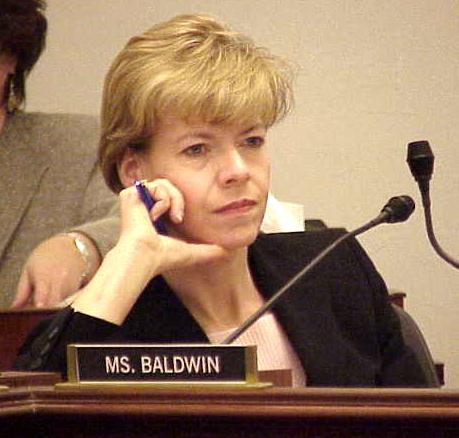A Congresswoman from a left-wing Wisconsin district,
she won her first statewide election in 2012, during the unexpected Obama GOTV
wave, replacing retired liberal Democrat Helmut Kohl (of the Kohl clothier
enterprise). Her strongly-backed conservative counterpart was former Wisconsin
Governor Tommy Thompson, also a presidential candidate, but chiefly known as a
successful welfare and education reformer.
Baldwin already has a record hostile to the Constitution.
She once introduced a bill which would override
state pro-life legislation (and thus, state sovereignty). Her record on
freedom of speech and the First Amendment indicate a disturbing hostility to the
First Amendment, one which not only Wisconsin residents should be aware of, but
the national voting electorate and media conglomerates should be wary of. Baldwin
has fallen into controversy a number of times in the local press, yet nothing has
pressured her nationally yet.
Within a year of her first term, she ended up in troubled
territory over
a bungled termination of one of her staffers. Why? The office personnel in
question had informed the junior US Senator about rampant abuses at a Veterans Administration
hospital, yet the Senator sat on the reports and did nothing. When the staffer
turned whistleblower, Baldwin fired her, then had to pay a severance
settlement, including a non-disclosure clause.
At its core, Freedom of Speech is about holding
leaders and legislators accountable, informing the public of the activities
(legal or illicit) perpetrated by the state. When elected officials not only
stifle information, but fire their subordinates for demanding action on
pressing issues, voters should pay attention, demand transparency, but above
all fidelity to the First Amendment, which protects freedom of speech in the
public sphere. Consider a private sector
example: celebrated finance guru Suze Orman sued her financial firm employer
because a subordinate had mismanaged her funds. The company could not retaliate
by terminating her. What gave US Senator Baldwin the notion she could
arbitrarily remove someone for simply telling her to deal with VA abuses?
Baldwin also signed on with the short-lived
Democratic majority in the US Senate last year, when 49 senators voted to gut
the First Amendment with a vote for another amendment to repeal Citizens United.
 |
The first version, introduced in 2013, outlined
specific limits on campaign finance. Because of negative press, perhaps particularly
from US Senator Ted Cruz (R-TX), the Democratic US Senators changed
the text :
Section
1. To advance democratic self-government and political equality, and to protect
the integrity of government and the electoral process, Congress and the States
may regulate and set reasonable limits on the raising and spending of money by
candidates and others to influence elections.
Legal jargon like “reasonable” invites unreasonable
outcomes with illiberal judicial activism. Why is spending money in politics
unreasonable in the first place? Elections are all about influence, and the
answer to speech, whether bad or false, is more speech, not less.
`Section 2. Congress and the States shall have
power to implement and enforce this article by appropriate legislation, and may
distinguish between natural persons and corporations or other artificial
entities created by law, including by prohibiting such entities from spending
money to influence elections.
This Amendment would clearly override the Supreme
Court Citizens United and McCutcheon decisions since they struck
down those monetary limits as unconstitutional.
`Section 3. Nothing in this article shall be
construed to grant Congress or the States the power to abridge the freedom of
the press.'.
The revision was deliberately vague, in contrasted
to the itemized powers which the Senate wished to accord itself. The added assurance
that this amendment would not “abridge the freedom of the press” is specious at
worst, vacuous at best. Any laws which abridge spending and investment
inevitably limit freedom of speech and the press, petition and redress.
That
Tammy Baldwin supported effort to redefine speech in America is destined to
fail, at least this time, as a result of Republican opposition. But Americans
and Wisconsinites ought to take notice. A major American party in the ‘world’s
greatest deliberative body’ is pushing for a measure that the ACLU says would
“lead directly to government censorship of political speech.”
Even the ACLU, a liberal legal advocacy group,
criticized this amendment. Thankfully,
Senate Resolution 19 failed in a cloture vote, but the fact that Democrats,
including
Senator Baldwin, cosponsored this First Amendment attacks is disconcerting.
Yet Baldwin’s redefinition of the First Amendment
has continued un-abridged:
Recently, following the Oberfelle v. Hodges decision, which imposed same-sex marriage on the
country through a contorted reading the Fourteenth Amendment, Baldwin not only
celebrated the ruling, but determined that religious objections under the First
Amendment would not withstand scrutiny:
Certainly
the First Amendment says that in institutions of faith that there is absolute
power to, you know, to observe deeply held religious beliefs. But I don’t think
it extends far beyond that. . . I think there are clear limits that have been
set in other contexts and we ought to abide by those in this new context across
America.
Justice Alito warned of this outcome in his
cogent,nblistering Oberfelle dissent:
I assume that those who cling to old beliefs will be able to
whisper their thoughts in the recesses of their homes, but if they repeat those
views in public, they will risk being labeled as bigots and treated as such by
governments, employers, and schools.
Freedom of speech and religion mean
nothing if individuals cannot exercise their rights in the public square,
fettering the mind to close spaces and secluded institutions.
Baldwin should revisit the First
Amendment, and Founding Father Thomas Jefferson’s Virginia
Statute on Religious Freedom for a crash course on what the Framers
intended and what the Constitution defines. If not, then Wisconsin voters, and
national reporters, must hold Baldwin accountable with a full and free exercise
of their First Amendment rights.
No comments:
Post a Comment